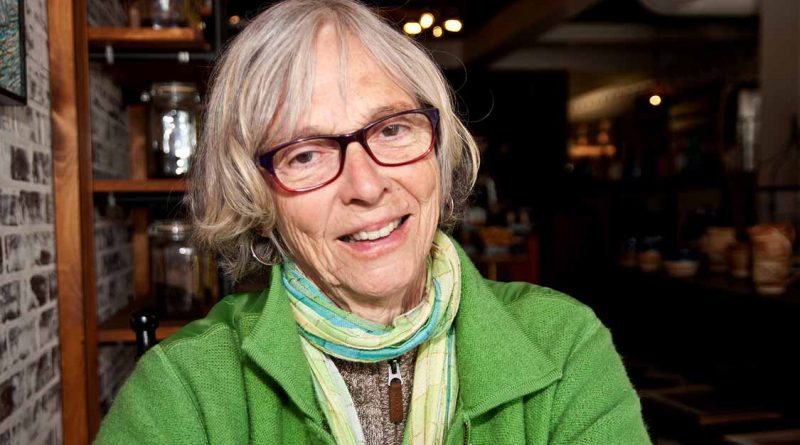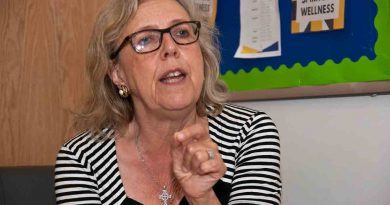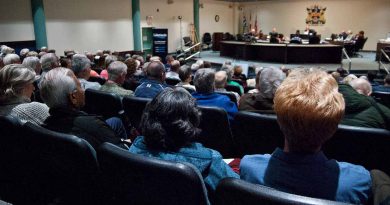The Road To the Federal Election
SUNonline coverage of the October 21, 2019 federal election continues with profiles of candidates running in Simcoe North. Interviews are presented as a series about a candidate’s life journey, background in the riding, political philosophies, and the platforms they and their parties have. Each candidate appears in the order they were interviewed.
Valerie Powell: Still In The Game
By John Swartz
Valerie Powell may have been late to the party this federal election, but as the Green Party nominee, voters should be familiar with her. This is her 5th election campaign. She ran twice federally and twice provincially before. She’s back in and still in the game.
“Oh yeah. Five percent is what we expect from our base. I got 11% once when people wanted Elizabeth May in. Having come in half way through because I can’t access the money, Erik’s campaign funds are tied up in his campaign account, so we’re running a no money campaign basically,” Powell said.
The reason a seasoned candidate got into the race so late is because she didn’t intend to run. Her husband Jamie suffered a stroke five years ago and she found being a full-time caregiver too much to make the commitment. But, she found some help and he way she tells it, Jamie has made some new friends and is kind of enjoying spending time with them at the facility he visits each day.
The party originally nominated Erik Schomann, but as many know, he was chased out of the election over accusations of racism because of a ten year old Facebook post made in jest.
“It’s all the negative attack ads. We were sick for him personally. He still suffers. He’s just destroyed. He really believed in what he was doing. He won’t get asked to be a candidate, he won’t get vetted as a candidate by any party. He’s a good person.”
“He actually was Muslim supporter when he made that because it was addressed to the terrorists. He had Muslim friends who all agreed, yeah those terrorists are giving us a bad name.”
Despite lack of campaign money, Powell has made some headway with voters at debates in the riding and feels she has a good chance to place well and that the issues she talks about have influence on the other candidates, not to mention the national party platform having influence on Parliament Hill.
“We’ve changed the landscape here and that’s a good thing, not a bad thing.”
A conversation with Powell, or any Green Party member reminds one of how many issues are tied to other issues and so some of the solutions have effect beyond the central idea being addressed. It’s no secret the party is about dealing with climate change, so conversations about what to do with the internet, housing, business influence on government, making sure people can survive financially in an uncertain work world also have a climate change component to take into account. For that reason and unlike previous candidate profiles this election, issues aren’t easy to present as compartmentalized themes, but we’ll try.
Role In The Green Party
Powell has been the party’s senior critic in the shadow cabinet for a few years. She brings a perspective having been a coordinator of behavioral support services at Waypoint Centre for Mental Health Care with an interest in Alzheimer’s treatment.
Like how climate change seeps into other areas of concern in the party platform, Powell does her best to make sure senior’s issues are taken into account with those same policy formations.
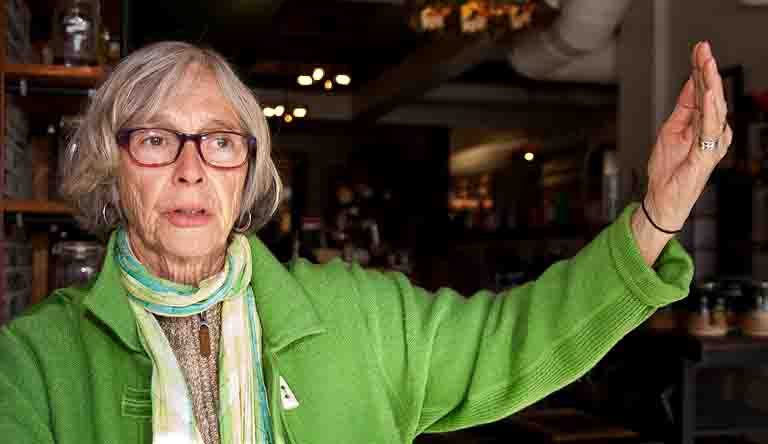
“I usually try to integrate seniors into policy. So with affordable housing, I make sure that within affordable housing there are choices for seniors. I put at all policies through a senior’s lens to make sure that they apply, but some things you can’t avoid that are specific to seniors,” said Powell. Of course dementia is a big concern.
“All the parties worked on a strategy. What they did was put in the budget $50 million over 5 years. Well dementia costs $10 billion in care, so the strategy is not going to address the growing, I’m going to call it an epidemic, of people with dementia. It’s not all seniors. Although it’s a disease, usually, of aging, you’re seeing way more people in their 50s, even 40s, the odd one in their 30s developing this.”
While discussing healthcare, euthanasia – not the headline grabber issue for Greens, yet they do have policy –is a subject of the platform.
“There are some recommendations to change the ruling to allow people to do advance directives about getting MAID (Medical Assistance in Dying) because you have to be competent to sign 5 or 10 minutes before it’s administered. Somebody with dementia may not be capable. There’s a number of diseases (also involved), so that’s a very challenging ethical, medical issue and the flip side of that, if we had really good palliative care people may not have to choose. Like all issues they’re all complicated.”
Another senior’s issue for Powell relates to party policy on drugs.
“We need pharmacare for all, but we also need to look at polypharmacy, especially with seniors who are being administered too many drugs. So we could save money by cutting down on drugs that are being wasted, prescribed in large amounts just because it’s easier.”
This raises a question about prescriptions. While not as out of control as south of the border, over prescribing, or normally prescribing painkillers and then stopping prescriptions before the pain has ended created a big problem with street drugs, opioids. Powell thinks there was some level of that happening, but the solution within healthcare is not ideal.
“Then we get the flip side, people who are really in pain now can’t get pain medication because physicians are afraid. It’s like anything, balanced goes out the window with knee-jerk reactions to any policy.”
Climate Change
One of the problems with describing and talking about climate change is how it’s presented. There’s a misconception – even at election debate tables – about what is meant by heading off a two degree rise in temperatures by some point in time. To understand better, it helps to know the 1850 benchmark average global temperature is used around the world as the starting point.
Why? That’s just before the internal combustion engine started to replace steam as the driver of the industrial revolution. So we’re not measuring from last year, or a decade ago, or the year we had record snowfalls back in 19-whatever. Until 1850, things were pretty stable measured over long periods of time, at least since the Ice Age.
So the target is preventing a two degree rise. If one knows already the global average is up one degree, one can begin to understand the concern of many, and of course the Green Party.
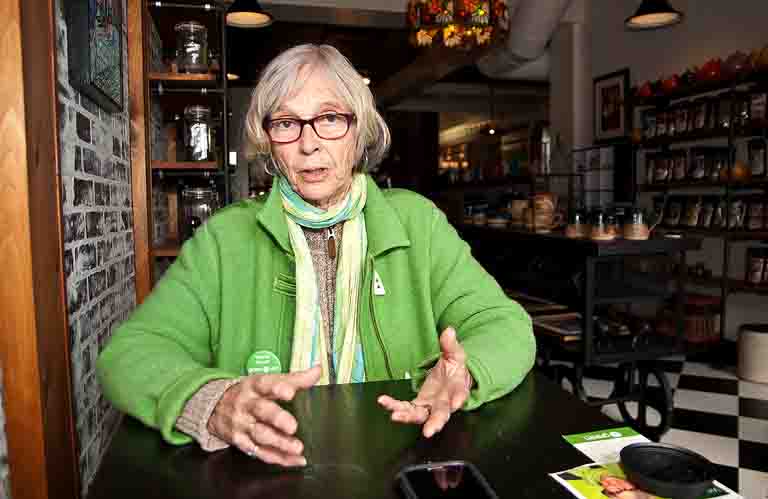
“That’s globally. If we were in Nunavut right now where they are seeing higher temperatures, they’re seeing the effects ten times more than we are seeing here.”
According to Canada’s Changing Climate Report, “The average (mean) annual temperature in Canada increased by 1.7 °C from 1948 to 2016, about double the global rate. Warming has been even stronger in the north. The average annual temperature in northern Canada (north of 60 degrees latitude) has risen by 2.3 °C over this same period, about triple the global rate.”
That we aren’t doing so well in Canada maybe puts the concern of Green Party membership, and others paying attention, into perspective. We are finally leading the world on something.
“I went to the class on climate change at Lakehead for teachers and I said I’m really trying here between giving you information about how bad it is and giving you information about hope. They said we do not talk specifically climate change under Grade 4 because it’s emotionally and psychologically and intellectually too hard when you are under 10 (years old).”
“The Green Party has been for the last 20 years talked about how we should transition to a clean energy future, renewable energy economy; it’s too late to transition. So we’re caught trying to be reasonable, fiscally responsible and our plan was to start training workers, give incentives to retrofit, we have incentives for people to design or build solar; it was a transitional thing while we are using fossil fuels.”
“It’s too late. People are going to suffer. If they don’t do anything – insurance rates, not getting insurance, flooding on the Black River, flooding on Lake St. John’s not like used to happen every year; severe drought, heat waves where everybody is ending up spending money now for air conditioning which is going to make matter worse, fuel prices going up – without a carbon tax – if people aren’t going to feel the effects if they don’t do something, they may as well feel the effects in constructing better and hopefully feel good about making a difference and making a difference for their kids.”
“It’s a war. When the war came (WWII) all parties worked together, countries worked together and they fought back against an evil force. It’s going to have to be just as intense on the climate. It’s going to have to take just as much cooperation between all parties and all countries to actually address it. People say, Canada, we don’t that have that many people. As individuals we are number one, we are just the worst because of our climate. We’re still individually the highest carbon user on the earth.”
Every Bit Counts
Powell offers some immediate short-term things people can do, but cautions most of the real change has to have the government involved.
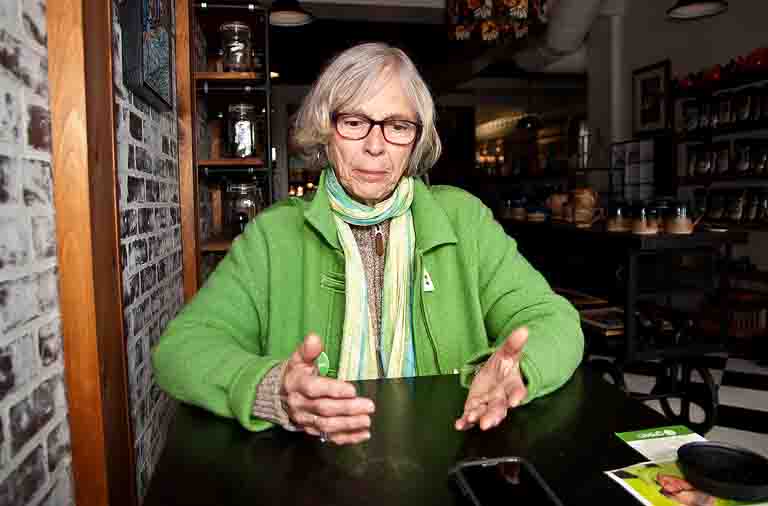
“The experts who are doing research and saying what are the four things an individual can do? I was really surprised, food waste -30% of our food is wasted, which means all the energy that goes into producing that food is emitting carbon is wasted if we are throwing it away,” she said.
“Reducing our red meat consumption will help. I’m not saying you have to be a vegetarian/vegan because there’s still a purpose for cattle in a balanced agricultural business. I don’t know why more people aren’t buying electric cars, or why cities aren’t using electric buses and fleets for their service vehicles.”
“It’s individual decisions, but they have to be backed up by systems. We wanted to buy an electric vehicle, so I go to the dealer and I said do you have an electric vehicle. Nope. End of discussion. The next time I was looking I said do you have a Prime, do you have one of those I could see? Nope. Do you want to make a sale? I had to buy my Prius Prime in Welland.”
Changing the Corporate Marketing Pitch
Powell thinks that situation of the example above changes when corporations either have incentive to change what they put on the market, or are regulate to do so.
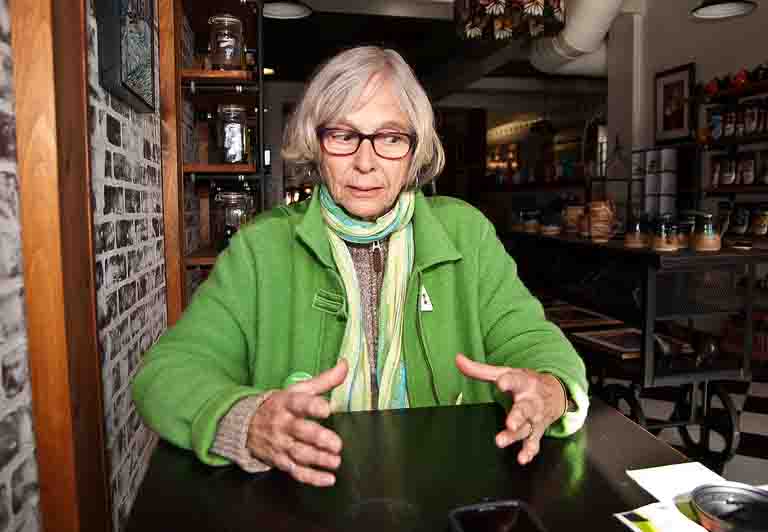
“Trucks, that’s what they are promoting. You never see an ad on TV for a Toyota Prius or Prius Prime. What’s the message? If there was a government incentive to switch that over, I’m sure they would. It makes no sense.”
Oil companies in particular benefit head office pay packets when they aren’t made to be more responsible with their practices.
“When they can’t get oil and they can’t sell it they just abandon those gas wells. There are municipalities out west that are going broke because they’ve got gas wells all over, the companies just walked. They have to do a cleanup,” she said. Powell thinks helping along a switch away from oil would give oil patch workers a future.
“People are smart. If it’s one thing we have is a lot of intelligent people and the reason they work for the oil and gas companies is because that’s where the jobs are. So if we could create jobs in the renewable energy sector, they won’t do oil.”
Tomorrow’s Jobs
Every candidate has been asked about their view regarding the change anticipated in how we work, how to deal with the unintended consequence of robots and automation taking jobs.
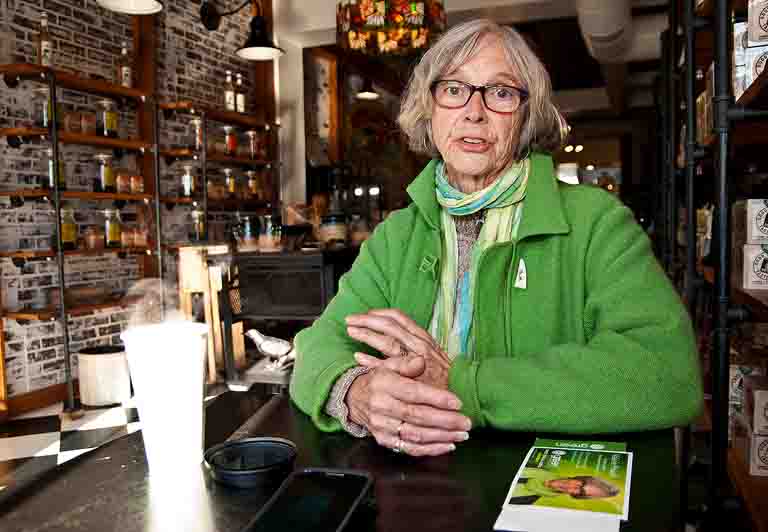
“I can remember when I was in high school we spent a lot of time talking about what we were going to do in the future because of automation we didn’t have to work 5 days a week, you might have to work 3 days a week, what were you going to do with all that free recreation time. That was a big issue. That was when there was one income earner in the home,” Powell said. One solution is putting monetary value on necessary jobs no one is paying for now, like keeping city’s cleaner, restoring wetlands and conservation work, the countless volunteers who help make communities better places in various ways, care giving for the sick, elderly, and young.
“Rather than think about the possibilities of automation displacing people’s jobs, what are the positive solutions that could be. We do have more time to do conservation, art, maybe people in niche businesses say in this world of automation we offer face to face service.”
“I think in some Scandinavian counties they started counting that care giving and giving a tax break incentive.”
It’s a shift in thinking, and a shift in how to fund keeping people from being terminally idle. Taxation is one way, maybe the only way, but Powell doesn’t think raising taxes to provide a universal basic income (UBI) in a land where corporate rates are significantly lower than our southern neighbor is a problem. The party has had policy regarding UBI for some time.
“Quite a bit. In fact we’ve had that as a policy for a long time. There’s been pilots across the world,” she said. Powell is dismayed about how Ontario’s experiment with UBI went.
“Those people who were the recipients and doing well, they were left stranded. The research couldn’t be finished on the Ontario project, but the thought is the money that is spent on what you could call shame based programs – welfare, you can’t get a job and you need help and all the ways people need money and help to get by – if there was a guaranteed livable income, there would be no shame.”
“It’s not going to give you a lifestyle of luxury, but it’s going to make sure you have a roof over your head and food in the fridge, then you can get by those difficult years and probably at the end of it you‘re more productive because you’ve gotten over the hump without it putting you down economically. There is an element in our society, there’s always percentage, vulnerable people, who aren’t fully employable and those are the vulnerable people we have to look after we are already looking after, you could save money on all the administration. Most people wouldn’t be satisfied with it, they’d want to work their way out of it.”
Still, somehow money has to be found to cover the cost, which turns discussion to the value of taxes and obliquely the mantra of Canadians needing tax cuts..
“I have been walking the Green Party line for over ten years. This is my 5th election and I did not plan on doing this election, but now that I’m in it, I am actually more committed and more determined to get to Ottawa, because every policy that is created by a handful of politicians affects where you drive, what kind of vehicle you drive, how far your house is to the grocery store, where your apples come from, where you coffee comes from, whether your water is clean or not, whether you are going to have power in the winter if there’s an ice storm, where your kids go to school, how well they are educated, what sex education they receive, whether you line up at emergency department or not, whether you have a doctor; these things that affect everybody on a daily basis, they’re not personal decisions often people can make. They are controlled by policy and those policies aren’t written for the people. People can say, “oh you’ve got money in your pocket.” Oh great, if I can have money in my pockets, but if I have no power, no local healthy food, no health care to rely on – what good is money in my pocket?”
“We need all those services and I think most people are willing to pay for it,” she added. Powell recalled a radio program to prove her point where the interviewer asked Scandinavians if they were bothered by their well-known high taxes.
“The woman said, “why? I have fabulous healthcare, free college tuition for my children, public transportation, I have everything I need, why would I complain?””
Electoral Reform
The Greens have been the vanguard for changing the system to elect a national government. Their preferred method is proportional representation where a certain number of seats are allotted based on overall voter percentage. As the party critic for seniors, she’s pretty sure where she’d be.
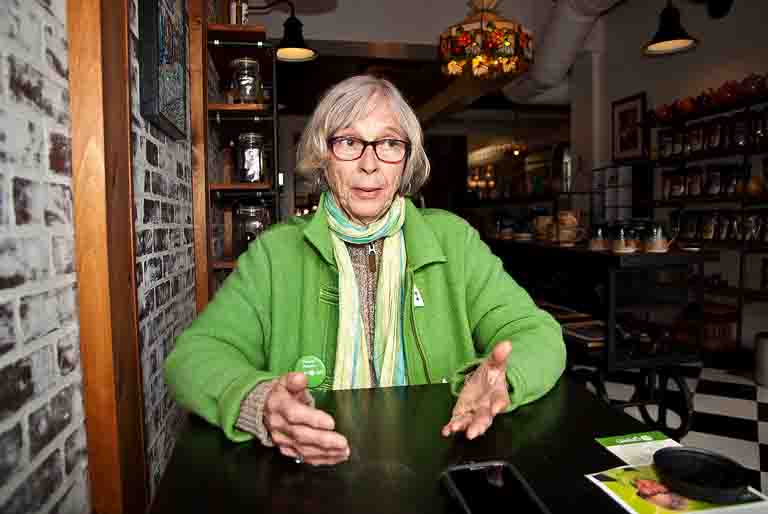
“If we got 10% of the vote across Canada, which we’ve gotten in the past, I’d probably be going to Ottawa after October 21st even if somebody else was elected in this riding because they have to balance the seats,” she said. It might balance out pre-election prognostication, improve the voting turnout and how people decide where their X goes.
“People tell you what they want in polls, but when they get into the ballot box they vote emotionally. So all it takes is a comment by Scheer, or Trudeau, or Singh or May two days or a day before the election and everybody who is undecided suddenly votes out of fear, or hope, or belief.”
“If in this riding everybody who didn’t vote last election voted for me, I’d get elected. That’s how many people don’t vote. The non-voter could make the decision, so the most important message for this election is to vote. The second part of that is to vote what you believe in, not strategically, so people get a true idea. Those who are governing, they need to know what people really want.”
Kingmakers?
How the election turns out at this time is nothing but a guess. However, it’s safe to say that the Greens won’t be forming a majority, or even get more than 10 or 12 seats (if polls are to be believed). It may be we will have a minority government, or a coalition may form once the voting ends.
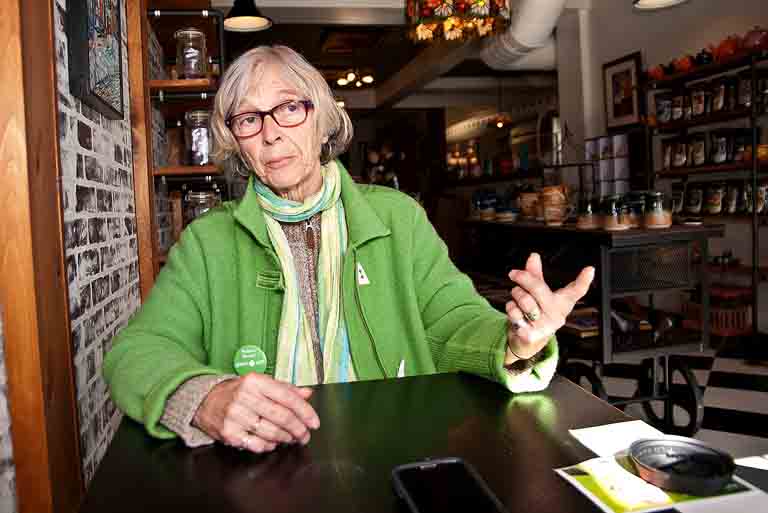
“We don’t want a majority government no matter who it is. Even if it’s Greens, we don’t want a majority government because we need collaboration. We need people to listen to each other, we need people to work together, we need all hands on deck to do something about climate change while we are working on the immediate problems of poverty, affordable housing , healthcare, those are ongoing, but the climate change needs to be addressed now.”
The Greens though, may hold the balance of power.
“Because we don’t know how it’s going to play out, Elizabeth May will cooperate with anybody if the policies get voted in. For instance if the Conservatives said we’re not going to do anything about climate change, no way is she going to prop them up or help them.” That could change, not the Greens, the Conservatives.
“If she could convince them not to, which is huge, she may cooperate in some other way because that just makes sense. If you could change your policy, that’s the most important thing, not sticking up for partisan issues.”
The Internet, Content and Control
There are two issues, who owns the pipes and who controls the message, which in Canada can be the same three big players, plus the usual suspects, Facebook and Twitter. The most important issue is content and the most important consideration is how to safeguard the integrity of messages received. Powell thinks the end user has a responsibility to discern.
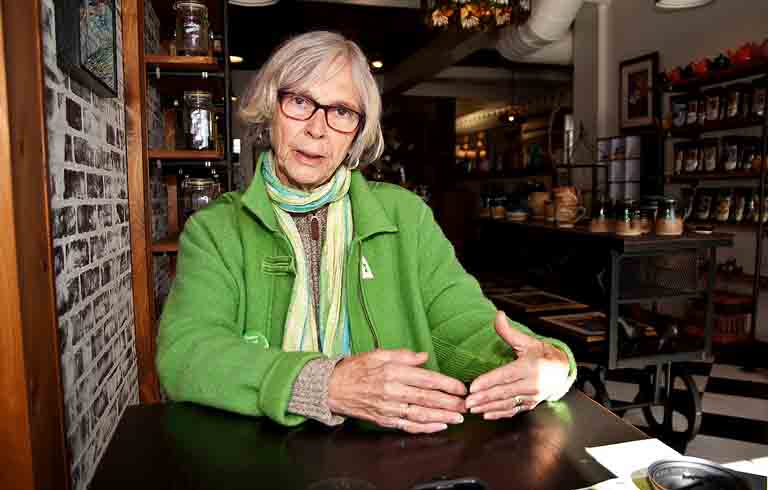
“I taught a course at Georgian College called Critical Thinking. I learned so much having to teach that course. It’s a bit of common sense stuff, but at the point where it’s beyond common sense you really have to work at critical thinking and beware of the words, the images, the message. If critical thinking were a mandatory course in elementary school or high school we may have more young people growing up being a little more savvy.”
That’s all good, if people had skills to recognize deceptive internet content, and more important could access any content.
“Simcoe County doesn’t have good internet service. If we’re moving to saying students need to do their homework and online courses and then we don’t have the access, we could jump to a 5G prematurely and then the wired system could become unaffordable or abandoned when in the long run it (wires, fiber) might be better.”
“As we’re discussing broadband and the internet, 5G could leapfrog over anything we’re talking about anyway. There’s an environmental impact. The 5G apparently also, that whole wireless system, emits energy and so people who are studying it now are looking at how a physical fiber system is better for the environment and more secure. We should be not giving up on a wired system and there are communities that are now looking at taking over the wired system in their municipalities so they have some control over the cost, the accessibility, the affordability and he messaging, which would then possibly take away some of the power from those big corporations.”
The Last Word
When asked what is missing from the conversation, Powell recaps a number of finer points related to things we could be doing and should be doing regarding climate change. Things like the City of Orillia having charging stations for electric cars, which first need to have the electrical distribution system beefed up to handle the load, and a number of other things.
But when it boils down, the big battle she sees is perception, our perception about climate change. In one way her statement sounded like a compliment, and it is, but it reveals a challenge to get voters to understand the importance of the Green Party message.
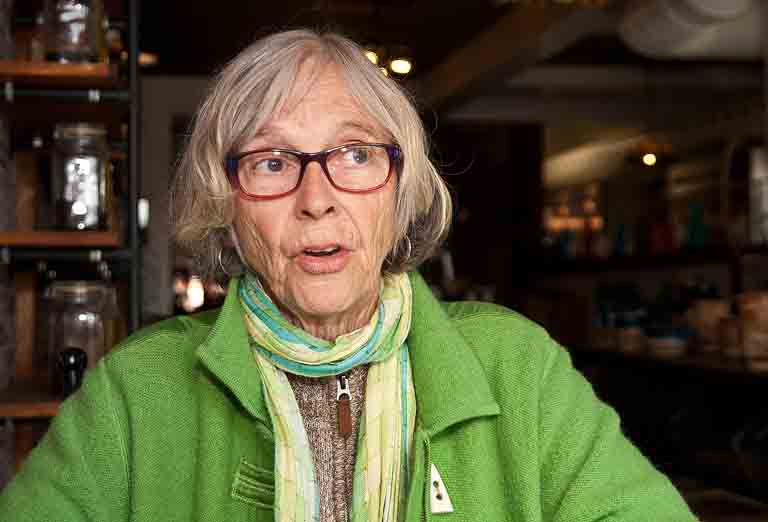
“There are a lot of people in Orillia who struggle health-wise, addiction-wise, affordable housing – wise, but I think we live in a bit of an ideal bubble here that we don’t really get it. Most people here don’t live in gated communities or ghettos. We’re not living with total blinders on to the rest of the population. We have a lake we can go swimming in. You could walk to the library, to the Opera House, cultural events – we have a mayor and a council who are trying to make sure we have events – we have a downtown, a university. We don’t see the effects of climate change as much as some people in the country. As a population in Orillia, we’re pretty lucky.”
Those things make it harder to not sound to Simcoe North residents like she and the Greens are punching the panic button repeatedly when we have developed a community with great things, and the things that need fixing don’t seem as dire as the world turning to dust. But the view in other places is not the same as here and she believes places like Orillia need to send Greens to Ottawa.
“There’s lots,” to do she said, “but you’ve got to start somewhere.”
(Photos by Swartz – SUNonline/Orillia)
Other Candidates:

